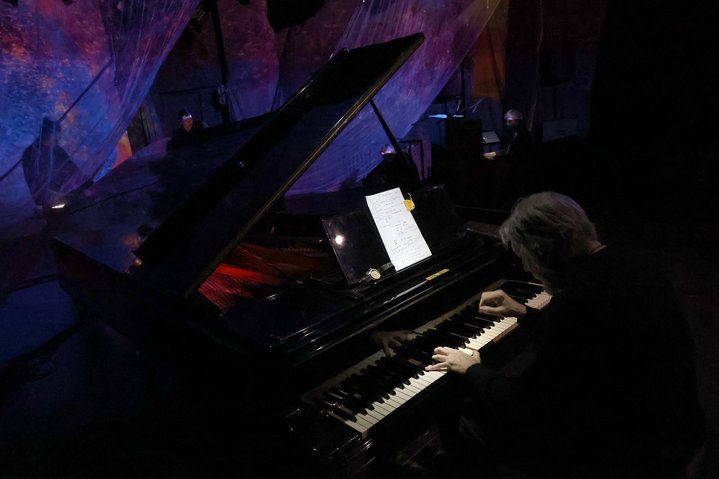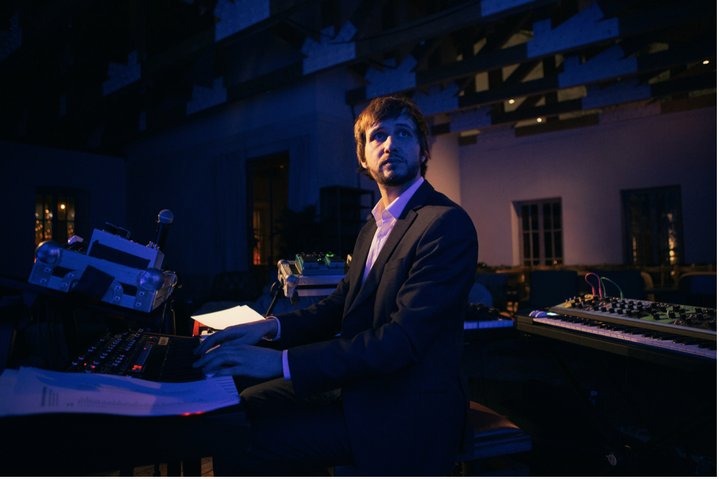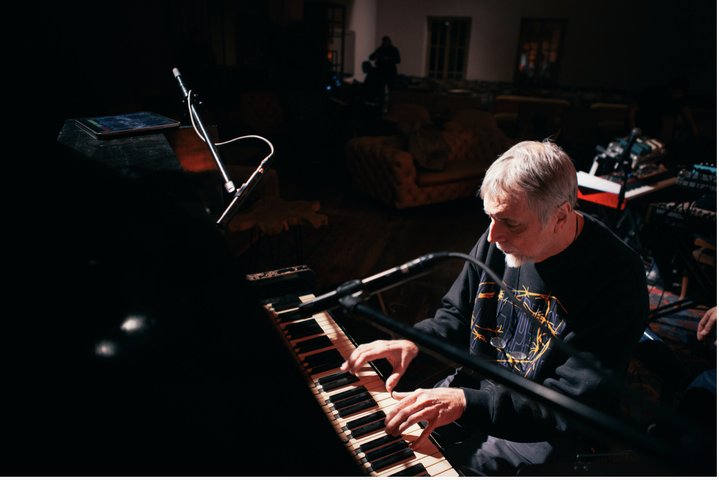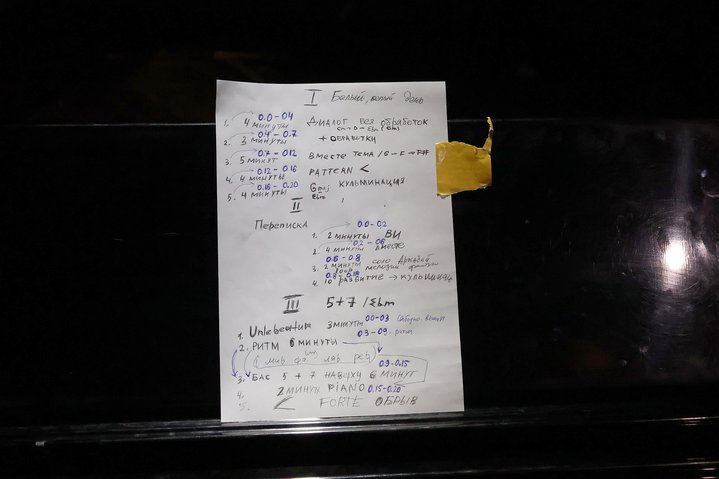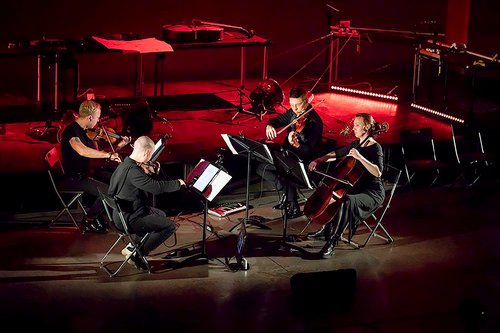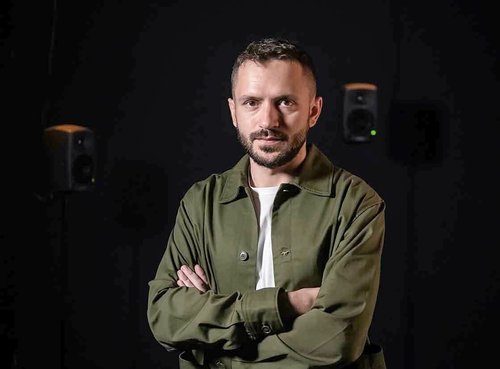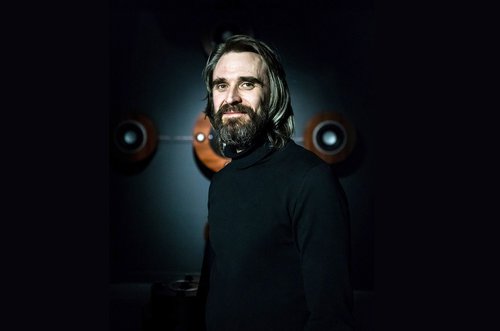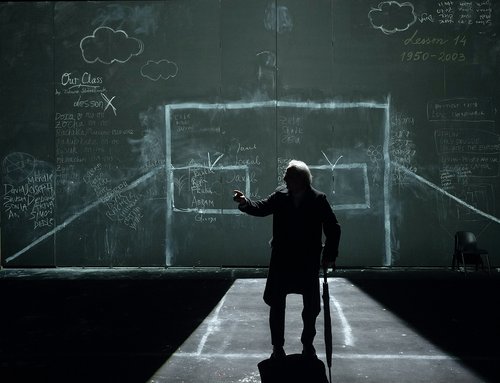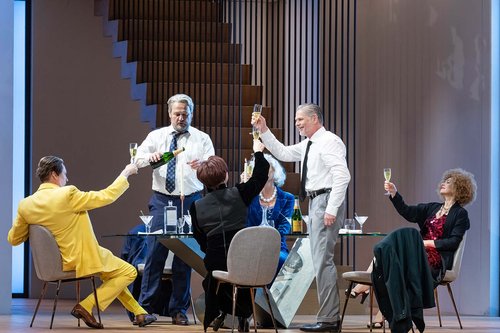In Dialogue With Gleb Andrianov
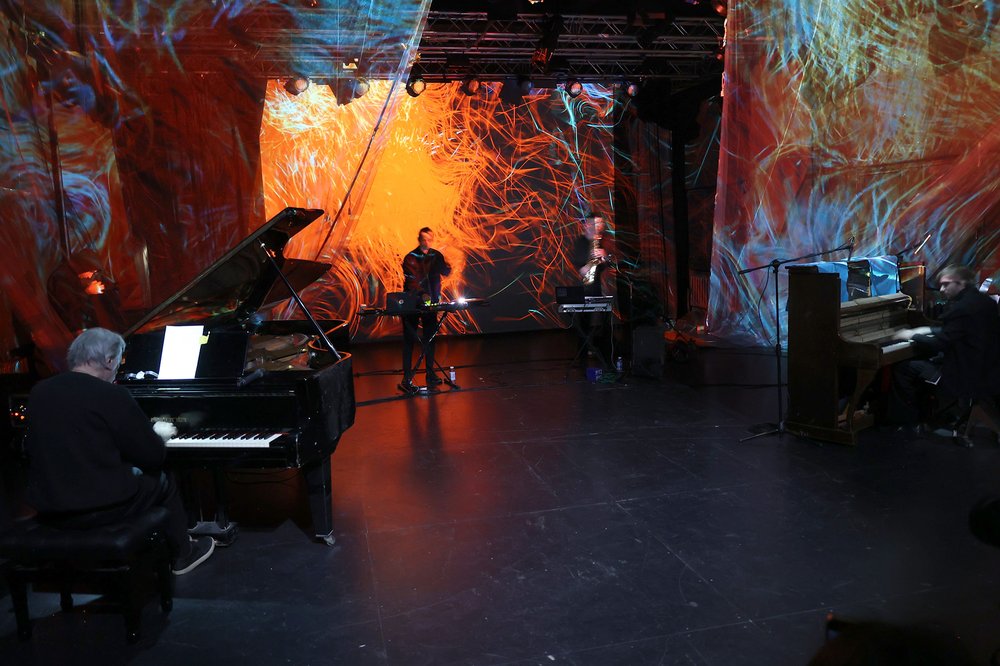
Gleb Andrianov. Dialogues, 2024. Featuring Vladimir Martynov and Cinematica Lab. Moscow, 2024. Courtesy of Denis Rylov
A series of innovative musical performances in Moscow called ‘Dialogues’ by Gleb Andrianov which mix improvisation with scored music, are a collaboration with both established and emerging composers and musicians, the first of which featured celebrated septuagenarian composer Vladimir Martynov.
The first of young Russian composer and pianist Gleb Andrianov’s ‘Dialogue’ performances in Moscow was a collaboration with Vladimir Martynov (b. 1946), a pianist and composer, theorist and philosopher of music, who published the contemporary classic, ‘The End of Time of Composers’. Martynov has written numerous film scores, and Andrianov trained as a film director and leads an orchestra called Cinematica, writing music which is known for its cinematic style. Both musicians, although representing different generations, are familiar with the type of minimalist language of film scores by the likes of Michael Nyman, Philip Glass, Yann Tiersen and other composers in the repertoire of Gleb Andrianov’s Cinematica orchestra. ‘Dialogue’ is not their first encounter on stage: Andrianov and Martynov first performed together last December, voicing a theme composed by Martynov for Paolo Sorrentino’s film ‘The Great Beauty’. Accompanied by an orchestra, together they deconstructed it using improvisation, as if literally deconstructing it into musical atoms.
For his Dialogues, Andrianov also used improvisation. The performance with Martynov was a work consisting of three compositions or parts, the central one called ‘Correspondence’, a musical dialogue both scored and improvised by Martynov with Latvian composer Georgs Pelecis (b.1947). The other two parts were both composed by Andrianov, the first of which, ‘White White Day’, is named after the working title of Tarkovsky’s film ‘The Mirror’.
Each of these three pieces expanded exponentially through improvisation to full catharsis, in the very capable hands of Arkady Pikunov (b. 1997) and Pavel Pankovsky (b. 1993) electronic musicians from the Index Trio project, who have worked with Andrianov before. Their job was to process the sound of the pianists. Pankovsky dissected the sound of Andrianov's piano, while Pikunov mostly processed the signals from Martynov.
The soloists were Martynov on the grand piano and Andrianov on the dissected piano, which sounded very unusual, soft and rounded, and at times it was reminiscent of the processed muffled sound of a xylophone. However, in the climactic moments of improvisation, under strobe lights which tore through the space in the pitch-black music hall, Arkady Pikunov’s saxophone came in, mesmerizing the audience, like Gary Windo’s brass part in the finale of Alife, the inspired composition by Robert Wyatt, which literally crumbles into microgranules when processed. And Pavel Pankovsky spiced it up with a confident, thick electronic noise-sound, not quite familiar to the classical ear, but recognizable and understandable to a whole new generation of listeners.
The music was enhanced by visual images on transparent curtains and a screen, in a three-dimensional space set around the musicians, creating a kind of change of consciousness. “Everybody needs dialogue. We all need to learn how to talk, we do not always know how to do it… It is very important to be aware of what listeners comes in with, and I would very much like our dialogue with them to result in some kind of transformation, and for music to influence processes that are important for everyone,” Gleb Andrianov explained.
I have always felt that improvisation is a bit like a diary, a place where you can pour out your emotions and do not have to reread or relisten to it. It is raw presence in the here and now, something that cannot be reproduced and which does not have any other value outside that moment in time. On the other hand, composition is victory over time, the meeting of expectations, the realisation of an idea that differs from the result. What Andrianov has shown us in ‘Dialogues’ is that synthesis is possible. It is a meditative experiment with familiar musical texture that goes beyond what is happening in the here and now without a desire to repeat it verbatim. After all, there will be more new experiments. “If you are improvising in an ensemble, it is experience enhanced by sensitivity. If you are alone, it is all about freedom, or if you prefer you can say it is a way of meditating”, said Andrianov.
Andrianov’s next ‘Dialogue’ performance will take place in Moscow at the end of April, in the Zotov Centre, a constructivist building just like the current venue, the ZIL Cultural Centre. About his future plans, Andrianov says: “I like to alter spaces beyond recognition during our musical experiments. To change things so much that they alter the very notion of what a concert is. I like working with constructivism, it contains many interesting forms and ideas”. Ever the pioneer, Andrianov enjoys collaborating, improvising, and trying unusual instruments, “you never know what will result from these explorations: new music, an album, or just an interesting experience? Sometimes music is just meant to be listened to in the moment”.






